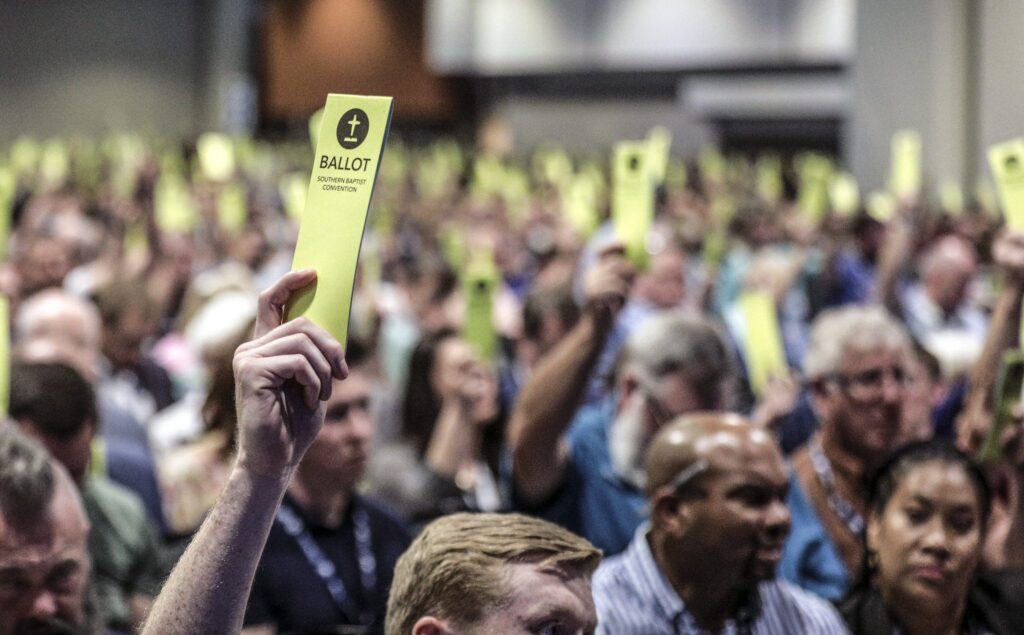

LONGVIEW, Texas (BP) – In the last couple of years, I’ve been asked a question more frequently than I ever anticipated having to answer: “Pastor, why are we still in the Southern Baptist Convention?”
As Southern Baptists, it seems like we can’t catch a break. Our cooperative efforts as Southern Baptists are at a tension point, some would say even at a breaking point. Over the last few years, we’ve weathered divisive elections, a pandemic, race riots, theological infighting, denominational squabbles, an abuse crisis and national leadership scandals. It seems like we keep shooting ourselves in the foot. Our own missteps have plagued us, and now many wonder if our cooperative effort is worth the effort. Have we become too divided for our cooperative endeavors to work anymore?
My answer to those who have asked the question about why we are still Southern Baptist is the same as it has always been: We are better together than we are apart. The Cooperative Program is still the best engine for Great Commission work in Church history. Our missionaries deserve our continued support. We have the best seminaries in the world. Disaster Relief teams represents the hands and feet of Jesus during crisis.
I believe in our work. And yet, truthfully, I have been as frustrated as some of you have been at the continual challenges we seem to face as Southern Baptists. In fact, I do believe our cooperation is in jeopardy. In the past few years, as the chairman of the Committee on Order of Business and as a member of the Sexual Abuse Task Force, I’ve seen our challenges up close. My prayer and hope for the Southern Baptist Convention is that our best days are ahead of us and that we will continue to be able to work together until Jesus comes back. Yet, for that to happen, there are three pressing needs we face.
First, if our cooperation is going to work, we need a new commitment to transparency.
Trust must be earned. These are hard, but true words: We have a crisis of integrity in Southern Baptist leadership. There have been repeated violations of trust in Southern Baptist life in the last few years. While it is true that the vast majority of our people, and the vast majority of our leaders, are godly men and women who have Christ-honoring character, there have been enough public leadership failures that our moral credibility has taken a very public hit. These leadership failures have hurt our cooperative efforts. At a national or local level, every time a leader commits adultery, covers up abuse, mishandles financial resources or fails to tell the truth, the reputation of Christ is brought under reproach, as is the reputation of Christ’s Church.
If our cooperative work if going to succeed, we need a new commitment to integrity in our leadership and transparency about our leadership. We need to make sure the windows are open and the light is shining into how we do our business. Transparency builds trust. The old admonition is wise: Tell the truth and trust the people. I believe when our Southern Baptist people have the right information, they tend to make the right decisions. When we are open and transparent about leadership decisions, how we steward financial resources, and how we are doing as we seek to care for the abused and protect the most vulnerable in our churches, we earn trust credibility for the ministry work the Lord has called us to complete.
Second, if our cooperation is going to work, we need a new commitment to unity.
Let’s be honest: Southern Baptists have struggled to maintain unity in recent years. Every few years, a new controversy emerges that tends to create boundary lines among us. We’ve argued over the years about Scripture, tongues and other charismatic gifts, the use of alcohol, Calvinism and most recently, the role of women in ministry. Some of these fights are worth having. For instance, if we can’t agree on something as basic as the nature of Scripture as inspired, infallible, inerrant, authoritative and sufficient, we are going to have a difficult time working together. However, some of our disagreements are needlessly divisive and hamper our cooperation. Some of our disagreements violate Paul’s teaching in Romans 16:17: “Now I urge you, brothers and sisters, to watch out for those who create divisions and obstacles contrary to the teaching that you learned.”
Tribalism kills cooperation. The genius of the Southern Baptist Convention has always been that we can cooperate because we agree on the main things while allowing some disagreement on the peripheral things. Historically, there have always been disagreements on tertiary issues among us. Yet, we have managed to stay together because we are together on the essentials that make us Baptists in the first place: essentials such as our commitments to the Bible, the autonomy of the local church, religious liberty and the Great Commission.
We seem to get derailed when either we fight over tertiary issues or we disagree about what is a tertiary issue and what rises to the level of a secondary issue. One of the challenges Southern Baptists face in this current moment is doing the work of theological triage. What are the minimum requirements to cooperate? What is the stack-pole around which we must have agreement? What are the issues about which we may disagree and still cooperate? What represents a secondary issue that would separate us denominationally and what represents a tertiary issue where we can disagree but still work together? Can we have a diversity of viewpoints on Calvinism, charismatic gifts, women in ministry, use of alcohol, practices of open and closed communion, end times viewpoints? Where must we agree and where can we differ?
If our cooperation is going to work, we need a new commitment to theological clarity and Gospel-centered unity. We must clarify those issues about which agreement is necessary and articulate those issues about which difference is allowable. We need to renew our commitment to working together with other like-hearted Baptists, even if we are not like-minded on how we articulate every theological belief. Unless we can be unified on the majors while still allowing differences on the minors, and mutually agree on what constitutes that which is major and that which is minor, our cooperation will not work.
Third, if our cooperation is going to work, we need a new commitment to generosity.
We need more robust financial generosity to the Cooperative Program if we are going to rise to meet the challenges of our day and time. We need more, not fewer, missionaries. We need to provide better, not worse, theological education. We need greater, not lesser, resources devoted to disaster and hunger relief efforts. This will require stronger, not weaker, financial commitment to the Cooperative Program.
Several things have hampered enthusiasm about Cooperative Program in recent years. The Great Commission Resurgence Task Force’s recommendation about “Great Commission Giving” may have had some unintended consequences, in that it may have inadvertently minimized the centrality of the Cooperative Program as the primary missions-giving mechanism in Southern Baptist life. Certainly, the abuse scandal has made it more difficult to be enthusiastic about continued financial support. The violations of integrity among some of our leaders have made strong financial support challenging.
Southern Baptists have been here before. The Cooperative Program was inaugurated in 1925. Within four years, Clinton Carnes, the then-treasurer of the Home Mission Board, embezzled $900,000 from the Board. On the heels of that scandal, according to Home Mission Board executive office files, the number of Home missionaries dropped from 1,600 to 106. Southern Baptists’ cooperative work was threatened in a major way. Yet, Southern Baptists rallied and renewed their commitment to generosity, leading to one of the greatest eras of evangelistic work ever experienced in Southern Baptist history.
The question facing Southern Baptists today is whether we will allow our current challenges to drive us apart or bring us together. I still believe in our people. I still believe in our mission. I still believe in the genius of the Cooperative Program. I still believe in our seminaries. I still believe in our missionaries. I still believe that those who wear yellow hats and move in to serve after disaster strikes represent the hands and feet of Jesus. I still believe we are better together than we are apart. If we will commit to greater transparency, more clarified unity, and stronger generosity, the Lord may bless our work once more in a greater way than ever before.
Andrew Hébert is the lead pastor of Mobberly Baptist Church in Longview, Texas. He is the author of Shepherding Like Jesus: Returning to the Wild Idea that Character Matters in Ministry.














